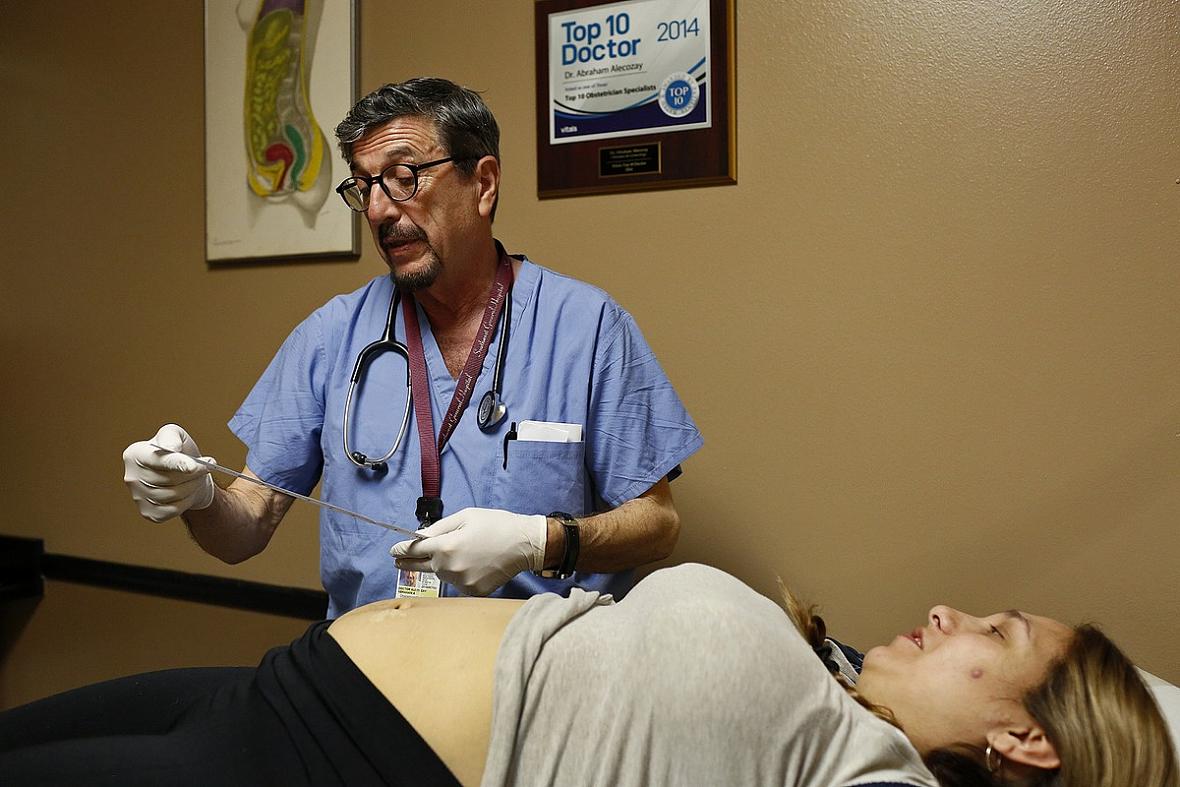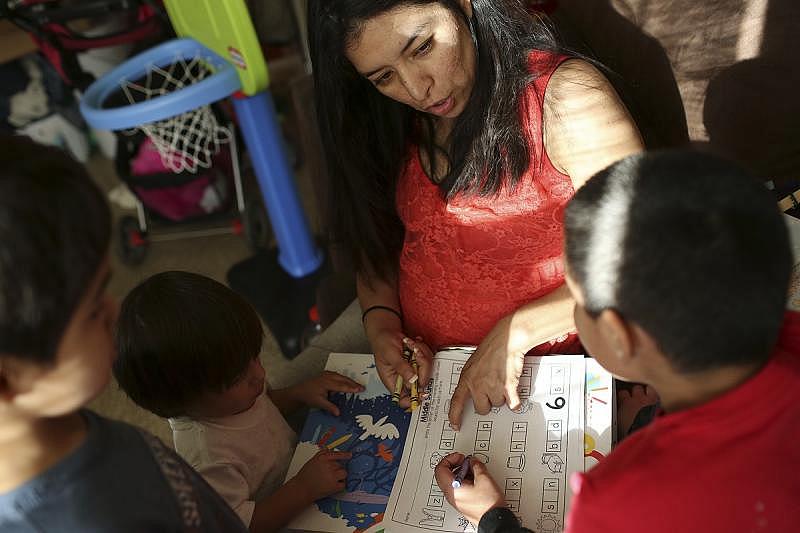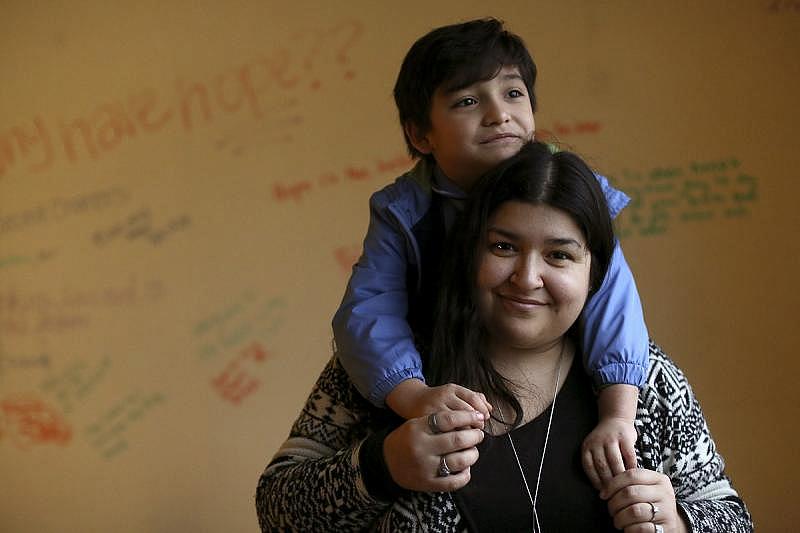Behind from the start: Why some women aren't receiving early prenatal care — Part 2
This article is the second in a series of three articles on prenatal care in Bexar County, Texas, which were produced as a project for the National Health Journalism Fellowship, a program of the Center for Health Journalism at the USC Annenberg School of Journalism.
Other stories in the series include:
Behind from the start: Prenatal care crisis puts babies in Bexar County, Tex., at risk — Part 1
Behind from the start: What can be done to help women receive prenatal care — Part 3

Dr. Abraham Alecozay, an OB/GYN, measures the growing stomach of Zully Torres during her exam at his office. Health-care providers track the growth of a fetus during pregnancy, one of the reasons experts recommend pregnant women receive early and consistent prenatal care throughout their pregnancies.
Jessica Sepulveda was worried when she started bleeding during her fourth month of pregnancy.
Although she had applied for Medicaid to cover her prenatal care appointments, she still was waiting for the state to determine her eligibility and hadn't found a doctor who would see her without the insurance.
Afraid something was wrong with her baby, Sepulveda rushed to an emergency room — the most expensive way to receive medical care.
"Me not being able to see the doctor, it was a scary feeling," Sepulveda, 29, said of the days leading up to the emergency room visit. “Anything could happen in those weeks.”
An ultrasound revealed the baby, due this April, was fine.
Sepulveda had been in this situation before — pregnant and without insurance. A few years ago, she was already five months along with her third child when she realized she was expecting a baby. Then she had to wait weeks for Medicaid to kick in so she could see a doctor.
Sepulveda isn’t alone. Waiting for Medicaid eligibility is a common experience in Bexar County and among the most oft-cited reasons women give for not receiving prenatal care as early as they should. It contributes to the rising number of babies born to women who received prenatal care after their first trimester or not at all.
Those babies accounted for nearly 40 percent of live births in Bexar County in 2014, according to data from the San Antonio Metropolitan Health District. Late or no care raises the risk of prematurity and other medical problems in babies and mothers.
The prenatal care deficit has worsened over the last several years, with the percentage of births to women receiving no prenatal care rising to 15.4 percent in 2014 from 2.7 percent in 2011. Health officials are at a loss to explain the increase and said they weren’t aware of the severity of the problem until the Express-News interviewed them for this series.
The plight of these women exemplifies how broader social and economic disparities in the United States limit access to health care and reveals a system that makes it difficult for some people to receive care.
Women who rely on Medicaid, which covers half the births in Bexar County, are less likely to receive early prenatal care than women with private health insurance. Some health professionals say state leaders' decision to not expand Medicaid makes it difficult for low-income women to have access to health care before they’re pregnant.
Applying for coverage once they’re pregnant means wading through a daunting form that’s 15 times the length of a 1040 tax form and then waiting for approval, which can take weeks. Among births in Bexar County to mothers receiving late or no prenatal care in 2013, 48 percent were paid for by Medicaid.
Making it to appointments isn’t easy for women who must travel 30 minutes or more by bus to reach a doctor, often hauling small children or trying to arrange for child care, only to sit for hours in a clinic’s waiting room. Some women won’t try because they can’t lose wages to see a doctor. Other women distrust the health care system because they’re worried about being deported or because they’re using drugs. And then there are the teenagers who often hide their pregnancies.
"What I conclude is people here don't know that they can receive care or that they’re afraid to seek it," said Dr. Thomas Schlenker, who was in charge of Metro Health until August. “I don’t think we have been welcoming or doing the necessary outreach to pregnant women in Bexar County and that’s reflecting in the fact that almost 4,000 women showed up for delivery in 2014 who had no prenatal care at all. Zero.”
Certain groups of women are less likely to get early prenatal care: Poor, black, Hispanic, unmarried, lacking a high-school diploma and teens. A major factor is whether the pregnancy is unplanned.
“Unintended pregnancy and late prenatal care go hand in hand, both among teens and older women,” said Dr. Janet Realini, president of Healthy Futures of Texas, a San Antonio nonprofit that seeks to prevent teen and unplanned pregnancies.
Women with unplanned pregnancies tend to realize they’re pregnant later, on average, than women trying to conceive, Realini said. A woman who is unpleasantly surprised to learn she’s pregnant likely won’t be as eager to make a doctor’s appointment as a woman who is happy about her situation.
'This arduous process'
The patchwork nature of health coverage in the United States means coverage can be a major hurdle for the uninsured.
"The easiest way to get connected to prenatal care early in your pregnancy is to have a primary care doctor," said Dr. Robert Ferrer, a family physician who cares for pregnant women at University Health System clinics.
“And then the minute you do your pregnancy test, you can call him or her up and say, 'Hey, I'm pregnant, where do I go,’” he continued. “Low-income, low-education women who aren’t connected to medical care in between their pregnancies because we live in a low-Medicaid state, they’re not in a position to do that. So then they have to sort of figure everything out when they see that pregnancy test come up positive.”
A survey of new mothers across Texas found that not having enough money or health coverage to pay for prenatal care visits was the top barrier to women getting care as early as they wanted. The survey, the Texas Pregnancy Risk Assessment Monitoring System, is conducted in partnership with the Centers for Disease Control and Prevention and the state health department.
A pregnant woman without insurance would pay about $2,000 for prenatal care for an uncomplicated pregnancy, said Mike Koroscik, CEO of The Institute for Women's Health in San Antonio.
Jessica Sepulveda helps her son Xavier, 5, with his homework as her son Joshua, 2, watches at their apartment in San Antonio. Sepulveda said if she had had insurance when she got pregnant, she would have been able to see a doctor sooner.
State leaders chose not to expand Medicaid as part of the Affordable Care Act, creating a so-called Medicaid coverage gap. More than 760,000 Texans earn too much to qualify for the state's Medicaid program but not enough to qualify for assistance through the ACA marketplace, according to an analysis released in October by the Kaiser Family Foundation.
Because Texas has very limited Medicaid eligibility, women of childbearing age who aren’t disabled often don’t qualify. Those women were least likely of all females to be insured in Texas in 2014. That year, 28 percent of women ages 18 to 44 were uninsured.
Texas does offer Medicaid for an adult caring for a child, but only if their income is very low: for example, no more than $3,756 a year for a single parent in a family of three.
An uninsured woman who is a U.S. citizen or legal immigrant can receive birth control and family-planning counseling under the Texas Women's Health Program if she earns $21,600 or less a year. The income limit is higher for bigger families.
When a low-income woman becomes pregnant, it’s much easier for her to qualify for Medicaid. For a single woman who makes $23,892 a year or less, Texas Medicaid provides health care benefits during pregnancy and up to two months after the birth.
For those who don’t qualify for Medicaid, because of their immigration status or because their income is slightly too high, the Children’s Health Insurance Program (CHIP) Perinatal coverage may be an option. A single woman with no children can qualify if she makes no more than $24,372 a year.
Under both programs, the income limit increases as family size increases.
But the bureaucracy of the health care system can make it difficult for women to understand that they qualify for coverage, said Kelly Bellinger, an expert in maternal and child health and former director of the San Antonio Healthy Start program at Metro Health.
And when a woman applies for Medicaid to cover her pregnancy, it can take weeks to receive proof of that coverage, said Bellinger, now a consultant.
Some health professionals and advocates for affordable health care say enrolling Medicaid isn’t easy, even for pregnant women who qualify.
"Some folks who have applied for any kind of services, their experiences have been that it’s this arduous application process, and you’ve got to bring these documents, and oops, you forgot that document, and oh, you’ve got to go get birth certificates," said Becca Najera, director of community health at the nonprofit Martinez Street Women’s Center. “Women become deterred by that experience.”
The application can be confusing or overwhelming for those with low literacy or who are intimidated by government forms, said Eric Cooper, CEO of the San Antonio Food Bank. Staffers at the Food Bank assist people in applying for Medicaid and other benefits to ease financial burdens hurting families’ ability to obtain food.
Cooper compares the H1010 form for public assistance to federal tax forms. Make a small mistake in the form or forget a document, and the application can be delayed or denied. Often people don’t understand why or that they can appeal that decision.
Some pregnant women make too much money for Medicaid but can’t afford to buy health coverage even if their employer offers it. Sometimes, even coverage through the ACA marketplace is too pricey for them, said Nancy Sanchez, client services manager at the food bank.
Jessica Sepulveda talks with her children, Joshua, 2, and Francesca, 11, as they play with their brother and cousins on the playground outside their apartment in San Antonio. Sepulveda is one of thousands of pregnant women in Bexar County to get late prenatal care.
Also, uninsured women who find out that they're pregnant outside of the ACA’s annual three-month open-enrollment period are not able to sign up for a coverage plan through the federal marketplace to pay for their prenatal care.
For women waiting for Medicaid approval, some physicians and clinics will determine if a patient can get short-term benefits while the state is processing the application — an option called presumptive eligibility — but many women are unaware of that opportunity, and not all health care providers offer it.
Sepulveda said she was unable to find a doctor who would see her before she had coverage. “I had to cancel three appointments because I was waiting for Medicaid,” she said.
She didn’t graduate from high school and got pregnant with her first child at 16. She relies on the bus because she doesn’t own a car. In the past, she’s stayed in a homeless shelter with her children, but now they live in public housing on the West Side.
She loves kids — “To me, they’re such blessings,” she said — but after her third son, she wanted to get a contraceptive implant to prevent another pregnancy.
“But I didn’t have insurance,” she said.
Pregnant and poor
Once women have coverage, they must find a way to appointments.
It's not unusual for Dr. Nichole Van de Putte to see her pregnant patients show up for their prenatal appointments with three kids in tow, having traveled by bus for an hour.
"I think they do the best they can with the resources they have," said Van de Putte, an OB-GYN at Southwest General Hospital who frequently treats low-income patients.
The challenges that accompany poverty can make accessing medical care difficult, experts said. Thankam Sunil, a sociology professor and director of the Institute for Health Disparities Research at UTSA, researched prenatal care among low-income women in San Antonio several years ago and published the results in the Maternal and Child Health Journal in 2010.
“We were able to find that there are a number of issues that are very problematic for these women to access prenatal care,” he said.
Transportation often is an obstacle. Pregnant women who already have children face the problem of who cares for the kids while she’s at the doctor.
Others put work before health care. Some can’t afford to forgo much-needed wages while seeing a doctor, and others face being fired if they take time off for doctors’ appointments.
Many women complained about long waits to see a health-care provider.
Odette Gutierrez holds her daughter, Angelica Valerio, 5. Gutierrez did not receive any prenatal care while pregnant in high school because she concealed her pregnancy from her mother.
“We’ve had experiences over the years with a lot of community clinics where sometimes the waits are very long,” Bellinger said. “These families sometimes wait three and four hours for an appointment. The system is just not being responsive to them.”
Some rural areas outside San Antonio have limited providers, and the lack of care leads to pregnancy complications. The patients then come to Bexar County to give birth at a facility such as University Hospital equipped to deal with those sorts of emergencies. Some pregnant women also come from Mexico to Texas to give birth, and how much, if any, prenatal care is unknown at the time of delivery, Bellinger said.
Some low-income families must prioritize more pressing issues than medical care unless there’s an emergency. Pregnant women often visit the San Antonio Food Bank to request food, said Sanchez, and say they haven’t seen a doctor during their pregnancy because they lack insurance.
“It’s not that they don’t care,” Sanchez said. “It’s just food is more important to them.”
'I didn’t want to tell anybody'
Odette Gutierrez has no photos of herself when she was pregnant or sonograms of her daughter in the womb.
Gutierrez was a 17-year-old student at Wagner High School when she found out she was pregnant. She concealed the pregnancy from everyone except her boyfriend and best friend until the night before she delivered her daughter, Angelica Valerio, in November 2010.
"I didn't want to tell anybody," said Gutierrez, now 23. “Nobody knew until she was born.”
Gutierrez never saw a doctor during her pregnancy. Angelica was born healthy, “thank God,” Gutierrez said.
It’s not unusual for teens to conceal their pregnancies, said Rollie Rockett, a certified pediatric nurse practitioner with the UT Health Science Center who works with pregnant students at Healy-Murphy Center.
“A lot of them are in denial,” Rockett said. Some teens may not recognize the signs of pregnancy and don’t realize their condition until seven or eight months along.
Others don’t realize it’s important to see a doctor early on, said Cheryl Weise, nurse supervisor of the Nurse-Family Partnership at the Children’s Shelter, which sends nurses into the homes of low-income, first-time moms for individualized help.
Jessica Alcala stands with her son, Jose Hernandez, 6, at the Restoration Center where she works as a drug abuse counselor. Alcala said health-care professionals often are judgmental of pregnant women with substance abuse disorders, which can deter women from seeking prenatal care.
“Our median age fluctuates between 17 and 18,” Weise said. “They’re not thinking health care. They’re still reeling from finding out they’re pregnant.”
Teen pregnancy has declined in San Antonio in recent years, but about 2,500 females age 15 to 19 gave birth in 2013, according to Metro Health.
Among births to females younger than 18, more than half were to mothers who received late or no prenatal care, Metro Health data shows.
Gutierrez is now a single mom, supporting her small family by working at a call center and selling nutrition products. Her pregnancy derailed her plans to attend Texas State University, and she hasn’t earned a degree.
She gets teary thinking about how her daughter might have been hurt because she didn’t see a doctor.
“My advice (to a pregnant teenager) would be to trust an adult about it,” she said. “It’s going to work out. You might be scared to death, but it’ll be OK.”
Fear, trust and family issues
Other women have different reasons to fear or distrust the health care system.
Jessica Alcala was a heroin addict who spent the first four months of her pregnancy clean before relapsing in her fifth month. Then she saw first-hand that the social stigma of drug addiction persists even among health-care providers.
"The medical field, they're not too knowledgeable on addiction," Alcala said. “I did have ugly experiences. There was a particular nurse, he was very judgmental of me.”
Some pregnant women who abuse drugs are too caught up in their addiction to seek care, but those who do often face discrimination, making them unwilling to return. And they often prefer to stay off the radar for fear Child Protective Services will get involved.
It’s a growing problem in Texas, where the number of women addicted to illegal drugs has risen in recent years, said Briseida Courtois, director of addiction treatment services at the Center for Health Care Services.
Alcala is recovered thanks to the center, where she now works helping others struggling with addictions. Her 6-year-old son, José, is healthy and thriving.
Drug addicts aren’t the only ones to avoid medical care.
Undocumented immigrants, for example, fear getting on the radar by visiting a doctor. Many don’t sign up for the public assistance they’re eligible to receive because they worry it could lead to deportation or that their children who were born here legally may lose their benefits.
And sometimes women who don’t speak English and women who are ethnic minorities feel they won’t be able to find health care providers who will speak their language or understand their culture. Pregnant women in violent relationships frequently avoid doctors, too, because they’re hiding bruises.
Some families’ cultures don’t recognize the importance of prenatal care, said Weise, with the Nurse-Family Partnership. A parent of a pregnant teenager may be unwilling to take the girl to the doctor, for example.
“If you don’t have that family support, or anyone who is validating the importance of prenatal care, then it makes it a lot harder,” she said.
[This story was originally published by San Antonio Express-News.]
Photos by Lisa Krantz /San Antonio Express-News.

